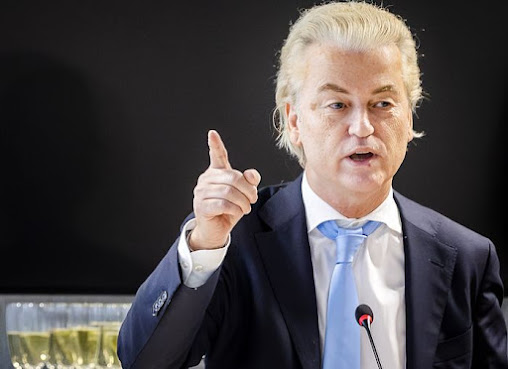Geert Wilders following the Dutch General Election last November. Photo Credit: Remko de Waal/AFP/Getty Images.
Fellow centre-left progressives, there is a problem. Hard right
populism is not going away. Across Britain, America and the European Union, in
some respects, it is only getting stronger.
Last month, at a town hall event in the US state of Iowa, Donald
Trump said that he would only be a dictator on “day one”. This was a chilling indication of the possible
kinds of fascistic authoritarianism that we could expect should Trump return to
the White House. How plausible is it to be a dictator on one day and then a
wholehearted democrat the next?
In the EU, things are little better. In November last year, many
were shocked to see the party of Geert Wilders come out on top in the Dutch
General Election. It was the first time a far-right party had triumphed in the
post-war history of the Netherlands. While in France, Marine Le Pen’s National
Rally continues to be a strong force in French politics. In Germany, the far-right Alternative for
Germany (AfD) party is polling in second place ahead of the Social Democrats of Chancellor Olaf
Scholz. Finally, and most alarmingly of all, in Italy last Sunday, a rally of hundreds of black
shirted, raised arm saluting fascists was held in Rome. Italy’s ruling
Brothers of Italy party, led by Prime Minister Giorgia Meloni, is itself a descendant
of Italy’s post-war neo-fascist movement.
What about here in Britain? Surely, Brexit must have vanquished
our hard right populist tendencies? Far from it. In a recent opinion poll, Reform UK (the rebranded Brexit Party) polled
11% in third place, ahead of the Liberal Democrats. As for the Conservative
Party, it continues to lurch towards the hard right on everything from
immigration to transgender rights. The former Tory Home Secretary, Suella
Braverman is clearly positioning herself for a future leadership contest. Under
her leadership, the Tories would become an unashamed party of the populist hard
right (assuming they are not already).
We on the centre-left of British politics need to stop pretending
that hard right populism will magically go away by itself. It won’t. If
anything, it is getting stronger and more forthright on both sides of the
Atlantic, not weaker. The only way to address this hard right populism is to
address the social injustices, the economic hardships and the precarity that is
helping to fuel it. For example, research has shown that economic inequality was a
significant factor
in the outcome of the 2016 Brexit Referendum.
Now is the time for a wholeheartedly progressive, even radical,
position on social and economic policy. Britain needs a radical break from
Thatcherism, not the continuation of an economic paradigm that has devastated
whole communities. An economic paradigm that has led to many working class and
lower middle class people having to live in profound economic insecurity and
powerlessness. These are the perfect
conditions of hardship, disillusionment and alienation from which hard right
populism can grow in strength.
Ahead of the next General Election, both Labour and the Liberal
Democrats need to be far bolder and more radical in their policy offerings to
the public. The NHS is under severe pressure by historic standards. Poverty continues to rise. The education of children is still suffering
from the impact of the pandemic. The housing crisis is continuing unabated. Tory
governmental kleptocracy is rife. And Britain is woefully falling behind on meeting its
climate change commitments, something that will lead to even more social injustices in the
future. Put simply, things cannot go on like this.
If these issues remain unresolved, then the populist hard right
will continue to thrive. The populist hard right offers simple divisive
solutions to complex problems. They target immigrants, asylum seekers, trans
people and other defenceless minorities, while ignoring the root causes of
economic injustice and social hardship. Thatcherism has to end by being
replaced by a new progressive consensus rooted in liberalism and real social
democracy.
The case for introducing a Guaranteed Basic Income targeted at the
poorest in-order to address poverty is overwhelming. A Guaranteed Basic Income
could end structural poverty once and for all. No one should be too poor to
afford to buy food or the essentials in life. It is not enough for people
merely to exist; they need to thrive. Therefore, any Guaranteed Basic Income
would need to rise gradually to reach the level necessary to lift people above
the poverty line.
The NHS, schools, housing and local government cannot be
“reformed” out of this crisis. They need a radical increase in public spending.
This raises important questions about the method of raising tax revenue. We
should shift the burden of taxation on to taxing asset-based wealth by
introducing both a land value tax and a mansion tax, while increasing capital
gains tax.
Our workplaces are in desperate need of democratisation. We should
seek to adopt a model of (German-style) co-determination that would lead to a
notable proportion of a company’s board being comprised of worker
representatives. This should exist in tandem with increasing the number of
co-operatives and mutuals within the economy.
Finally, we on the centre-left have to acknowledge that the
privatisation of rail, water and energy has failed, while private executives
and elite shareholders have benefited from the profits generated. The railways should be nationalised and
brought into public ownership. We should consider doing the same for energy too
(at least in terms of national energy infrastructure). Whereas the regional
basis of the water industry makes it a prime candidate for mutualisation. This
would see the profits of the water companies shared for the benefit of
consumers, while consumers would help to elect the governing boards of the
water companies.
These measures are needed if we are to build an economically just
society. Only a just society can hope to address hard right populism. We need
to forge an alternative consensus to Thatcherism, one that is centred around
liberalism and social democracy. Hard right populism will only be defeated by ending
the economic and social injustices that are fuelling it. Otherwise, liberal
democracy in Britain and numerous other countries shall continue to suffer.
I will leave you with the words of Franklin D Roosevelt. “True
individual freedom cannot exist without economic security and independence.
People who are hungry and out of a job are the stuff of which dictatorships are
made.” In 2024, progressives on both sides of the Atlantic need to heed
Roosevelt’s words now more than ever.










